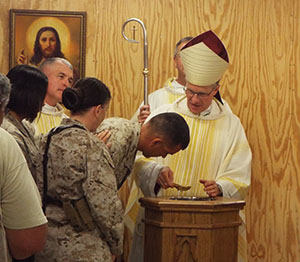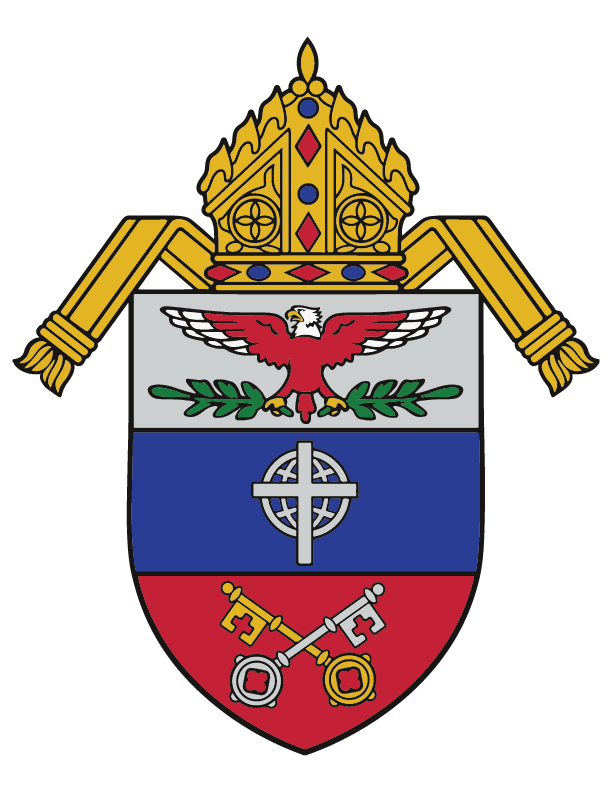“Baptism, the door to life and the Kingdom, is the first Sacrament of the New Law, which Christ offered to all that they might have eternal life and which, together with the Gospel, he later entrusted to his Church, when he commanded his Apostles: “Go, teach all nations, baptizing them in the name of the Father, and of the Son, and of the Holy Spirit.” Therefore Baptism is first and foremost the Sacrament of that faith by which human beings, enlightened by the grace of the Holy Spirit, responds to the Gospel of Christ.” (The Order of Baptism of Children, no. 3)
“Baptism is birth into the new life in Christ. In accordance with the Lord’s will, it is necessary for salvation, as is the Church herself, which we enter by Baptism (Catechism of the Catholic Church, no. 1277).”
“Baptism imprints on the soul an indelible spiritual sign, the character, which consecrates the baptized person for Christian worship. Because of the character Baptism cannot be repeated (Catechism of the Catholic Church, no. 1280).”
Who can be Baptized?
 Any person not yet baptized, those who have been baptized but are unable to locate their record or proof of baptism (called conditional baptism), and those who have been baptized without proper matter (water) or form (in the name of the Father, and of the Son, and of the Holy Spirit) can be baptized in the Catholic Church. Decisions regarding who can be baptized are determined by the priest (c. 869, §1; c. 845, §2).
Any person not yet baptized, those who have been baptized but are unable to locate their record or proof of baptism (called conditional baptism), and those who have been baptized without proper matter (water) or form (in the name of the Father, and of the Son, and of the Holy Spirit) can be baptized in the Catholic Church. Decisions regarding who can be baptized are determined by the priest (c. 869, §1; c. 845, §2).
Adults
Adults who desire baptism, are sufficiently instructed in the truths of the faith and in Christian obligations, and are informed of sorrow for sins may receive a valid Baptism (c. 865 §1). Adults are to be prepared during the period of catechumenate according to the Order of Christian Initiation of Adults. Adults should not be refused baptism because they are impeded from participation in a formal Christian initiation process. Other means of instruction should be explored (PM 4.1.6.1).
Infants
An infant may be baptized if at least one parent (or lawful substitute) consents and there is a well-founded hope that the child will be raised in the Catholic faith. In the absence of this hope the Baptism should be deferred (c. 868 §1).
Children of Catechetical Age
All unbaptized children between the ages of seven and eighteen are to receive the Eucharist and Confirmation at the time of baptism (cc.866; 883,2) (National Statutes #14,18,19). Celebrating the sacraments of initiation together maintains their integrity and unity (RCIA #215).
Who Can Celebrate Baptism in the AMS?
 Subjects of the Archdiocese for the Military Services, USA are encouraged to begin preparation for baptism by contacting the AMS priest or Coordinator for Religious Education at the military installation where they serve.
Subjects of the Archdiocese for the Military Services, USA are encouraged to begin preparation for baptism by contacting the AMS priest or Coordinator for Religious Education at the military installation where they serve.
Those who are not subjects of the AMS, even if they have regular access to military chapels, require the written permission of the civilian pastor of the parish where they reside to participate in the preparation process at the installation. Agreement of the priest at the installation must also be sought before the preparation process commences.
No special permission is needed for priest-chaplains to baptize Eastern Rite Catholics who are subjects of the AMS. The proper Rite of Ascription should be noted on the Sacramental Record (PM 2.3.3).
Note that access to military installations is restricted. Some connection with the military is required for non-AMS Christian faithful to celebrate baptism in the installation chapel.
Elements and Steps for Celebrating Baptism in the AMS
- Meet first with the priest or Coordinator of Religious Education
- Preparation: Pre-Baptismal Catechesis
- Being Accompanied by Godparent/s
- Celebration of Baptism
- Mission
This outline contains the basic elements and steps that form the period of Catholic preparation for baptism. The AMS priest or designated coordinator can provide more details.
1. Meet first with the priest or Coordinator of Religious Education
Contact the Catholic priest or CRE at your installation to inquire about the baptism preparation process. At this initial meeting, the priest or coordinator will:
- Give an overview of the process to be baptized in the AMS.
- Explain the Church’s understanding of baptism.
- Explain the process of seeking Godparents to accompany the individual throughout the process, during the celebration of baptism, and throughout their lives.
- Explain the role of community support and prayer through the process.
- Collaborate to share when the next baptism preparation sessions are scheduled.
2. Preparation: Pre-Baptismal Catechesis
 a. For parents of infants and young children
a. For parents of infants and young children
Infants up to age seven years
Preparing for infant Baptism is done according to the norms requested by your priest.
“Since the earliest times, Baptism has been administered to children, for it is a grace and a gift of God that does not presuppose any human merit; children are baptized in the faith of the Church (Catechism of the Catholic Church, no. 1282).” Preparation for baptism should include instruction or review of the sacrament and the importance of raising the child in the Catholic faith.
Age seven through adult
Preparing for Baptism ages seven through adult requires going through an age-appropriate Order of Christian Initiation of Adults.
b. Children and Youth Ages 7-18
An age-appropriate Order of Christian Initiation of Adults process should take place as these candidates will receive Confirmation and Eucharist at the time of Baptism. The godparent(s) have a very important role for this age group in dialog and participation through each step of the process with the candidate.
c. Adults
Preparation for Baptism occurs during the period of the catechumenate according to the Order of Christian Initiation of Adults. In extraordinary circumstances that preclude going through all the stages of preparation: inquirer, catechumen, elect, the minister of Baptism may prepare referencing the Simple Rite for Initiation of an Adult (PM 4.1.7.1). Marriage cases before the Tribunal must be finally adjudicated before baptism or reception into the Church (PM 3.5.1).
3. Being Accompanied by Godparents, Proxy Godparents, and Witnesses
a. Godparent(s)
 There may be one godfather or one godmother or one of each (c. 873). If there is only one, the godparent may be of either sex.
There may be one godfather or one godmother or one of each (c. 873). If there is only one, the godparent may be of either sex.
- For adults: the godparent(s) assist in Christian initiation.
- For children: the godparent(s) along with the parents present the child for Baptism and help the child to lead a Christian life in accordance with the sacrament.
Qualifications for Godparents
- Chosen by the adult to be baptized or by the parents for children (or by those who take their place and in special cases by the priest or deacon).
- Intend to perform the role of godparent.
- Must have completed their sixteenth year.
- Must be a Catholic who is confirmed, has received First Eucharist and lives in harmony according to the role of godparent.
- Is a Catholic in good standing with the Church.
- Are not the father or mother of the person to be baptized (c. 874, §1).
b. Proxy Godparents
If godparents cannot be present for the Baptism, proxy godparents may stand in their place. The godparents must accept the responsibility of being the actual godparents. Parents may act as proxies and in unusual circumstances, a non-Catholic may be a proxy (PM 4.1.10.4).
c. Witnesses
A person belonging to a non-Catholic ecclesial community may only serve as witness to the Baptism along with a Catholic godparent (c. 874, p. 5, §2).
4. Celebration of Baptism
a. Time
 Baptism may be celebrated any time, however on Sundays is preferable or if possible, especially for adults, at the Easter Vigil. Celebrating Baptism during Sunday mass emphasizes its “communal aspect and relationship to the Eucharist” (PM 4.1.12.1). Infants should be baptized within the first few weeks after birth (c. 867). Adequate time may be allowed in consideration of military schedules or other circumstances.
Baptism may be celebrated any time, however on Sundays is preferable or if possible, especially for adults, at the Easter Vigil. Celebrating Baptism during Sunday mass emphasizes its “communal aspect and relationship to the Eucharist” (PM 4.1.12.1). Infants should be baptized within the first few weeks after birth (c. 867). Adequate time may be allowed in consideration of military schedules or other circumstances.
b. Place
A chapel, church, or oratory is the proper place for Baptism, however emergency baptisms may occur with a completion of the ceremony done at a later time. This ceremony held later omits the pouring of water. See “The Rite of Bringing a Baptized Child to the Church” (Rite of Baptism for Children).
5. Mission
The baptized share in the ministry of priest, prophet, and king, and to proclaim the good news.
a. Parents of the Baptized
“Parents have the mission of teaching their children to pray and to discover their vocation as children of God. The parish is the Eucharistic community and the heart of the liturgical life of Christian families; it is a privileged place for the catechesis of children and parents (Catechism of the Catholic Church, no. 2226).”
b. Older Children and Adults
Through Baptism and faith, the holy people of God share in the priestly vocation. Christ the high priest, true God and true man created the a kingdom of priests. “The baptized, by regeneration and the anointing of the Holy Spirit, are consecrated to be a spiritual house and a holy priesthood” cf. Heb 5:1-5; Rev 1:6 (Catechism of the Catholic Church, no. 784).
